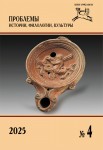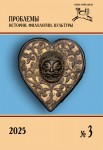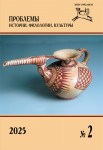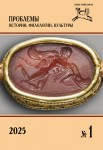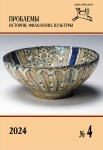ATTENTION! Dear authors, please send materials to the new mail This email address is being protected from spambots. You need JavaScript enabled to view it., the old mailbox is invalid!
The academic journal PIFK (Problems of History, Philology and Culture, Journal of Historical, Philological and Cultural Studies) is one of the leading Russian academic periodicals which publishes results of studies in fields of the history.
Founded in 1994, the PIFK has been regularly published by Nosov Magnitogorsk State Technical University jointly with the Institute of Archaeology of RAS and Institute of Archeology and Ethnography of the Siberian Branch of RAS.
The Editorial Board consists of renowned Russian and foreign specialists.
All publications are free of charge.
Aims and Scope
The PIFK’s primary focus is to inform academic circles about new discoveries and achievements within its scope of interest. The Journal’s publications are theoretical works in archaeology, world history (prehistory, ancient and medieval history, including works on the analysis of monuments of writing and culture (art) of the specified periods ), field research materials of archaeologists, ethnographers, museum and archival materials, source translations, academic chronicles, conference materials and round table discussions as well as critical articles and reviews of articles addressing the issues related to the academic fields covered by the Journal.
Journal Sections:
- Research articles
- Publications
- Ancient Civilization: New Discoveries
- From the World's Museum Collections
- From Science History
- Discussions of controversial issues
- Personalia
- Scholarly life Supplement: commented editions and translations of ancient texts/
The Journal has an electronic version which is available on the website www.pifk.magtu.ru after the printed version of an issue is released.
Impressum
Editor-in-chief: Mikhail Abramzon
ISSN (print): 1992-0431
ISSN (online): 2658-316Х
Pages per issue: 240 to 270
Periodicity: quarterly
Rospechat subscription index: 36800
All publications are free of charge.
Before being published all articles are subject to peer-reviewing and editing and are assigned DOI indices.
An article may be rejected if it fails to meet the established requirements.
All incoming articles are checked for plagiarism in the system Antiplagiat.Vuz. Articles with more than 30% of unacceptable plagiarism shall be rejected and returned to their authors.
Authors shall ensure that their work has never been published before. If a part of an author’s work has been published before (e.g. as an article, monograph, thesis synopsis, etc.) in the author’s native or a foreign language, the author is obliged to provide a reference to the previous publication while indicating in which way the current work is different from and how it is related to the findings posted in the previous publication. The maximum word for word copying of an author’s own articles or parts of their content allowable is 30%. Paraphrasing of previous articles is not acceptable.
Open Access Policy
This is open access journal, which means that all its content is freely available without charge to the user or download, distribute, copy, print, search or link to the full text of the papers, or use them for any other lawful purpose, without asking prior permission from the publisher or the author. This is in accordance with the BOAI definition of Open Access.
The Journal into the international information analitical system of scientific quoting "European Reference Index for the Humanities" (ERIH PLUS), i.e. the European Science Foundation database, which is running by means of Norwegian Social Science Data Services (Norway), Open Academic Journals Index (OAJI) is a full-text database of open-access scientific journals, Russian Science Citation Index (RSCI).



